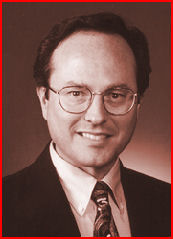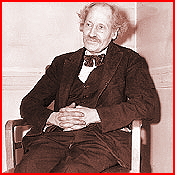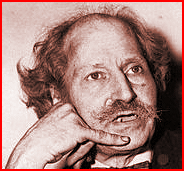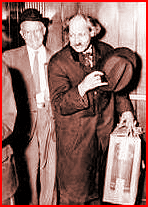The powers that be over at The Shepherds' Fellowship have graciously granted permission to post this article here.Christianity Astray
Perhaps you page through each month's issue of Christianity Today as I do—baffled and disconcerted to see that venerable magazine being used as a platform for so many of the dubious fads and disturbing theological trends that constantly flourish at the fringes of the evangelical movement.
Until now, all I could think to do was wince and chuck the magazine in the circular file.
But from now on, I'm going to express my frustration by writing about it.
 Pulpit magazine—the online periodical of The Shepherds' Fellowship—has allotted me a column ("Christianity Astray") to write about the latest aberrations seeking acceptance from the evangelical mainstream—in the pages of CT and elsewhere. This is from the May/June 2005 issue of that column. Pulpit magazine—the online periodical of The Shepherds' Fellowship—has allotted me a column ("Christianity Astray") to write about the latest aberrations seeking acceptance from the evangelical mainstream—in the pages of CT and elsewhere. This is from the May/June 2005 issue of that column. |
 Phil Johnson Phil Johnson
http://www.romans45.org |
|
The Scandal of the Evangelical Fringe
For some thirty years, Ron Sider has been one of the most outspoken political liberals in the evangelical menagerie. He doesn't like that label,
liberal. (And, to be fair, he is no knee-jerk leftist. Sider opposes abortion and doesn't support the gay-rights lobby.) But Sider's friend and fellow evangelical liberal Tony Campolo (who
doesn't mind the label and who
has voiced sympathy for much of the gay-rights agenda) says Sider is definitely a man of the left. According to Campolo, "If you want to know Ron Sider's view on capital punishment, you don't even have to ask. If you want to know his view on El Salvador, you don't have to ask. If you want to know what he thinks about disarmament and the military, you don't even have to ask. If it looks liberal, and it smells liberal, and it tastes liberal,
it's liberal."As a matter of fact, the first edition of Sider's 1977 book,
Rich Christians in an Age of Hunger, was so fiercely radical that some early critics denounced it as socialism in sheep's clothing. Sider blamed all poverty on systematic injustice perpetrated by governments, corporations, and economic systems. "Evil" was something embodied in institutions. Almost every solution he proposed involved a scheme for restricting capitalism and transforming government into an instrument for the redistribution of wealth. Out-and-out Marxists could—and did—advocate many of the same policies Sider championed.
In 1981, David Chilton wrote a scathing book-length rebuttal, published by the Institute for Christian Economics (ICE) and titled
Productive Christians in an Age of Guilt-Manipulators. Chilton argued (quite convincingly) that Ron Sider's views on economics were wrongheaded, naive, unbiblical, and full of potential mischief. The release of Chilton's book coincided roughly with the end of Jimmy Carter's administration, the onset of the Reagan years, and the rise of the religious right. Sider's book (which had already sold more than a quarter million copies) suddenly all but disappeared from the evangelical radar.
Although he still prefers left-wing politics, Sider's views have softened considerably over the years. What persuaded him to tone down his radicalism is not entirely clear. It might have been Chilton's book, the collapse of Communism, the changing political climate in America (especially with the militant secularization of the radical American left), or all of the above. Whatever the reasons, Sider has issued two major revisions of
Rich Christians (a second edition in 1984, and a twentieth-anniversary third edition in 1997). Each new edition was significantly less radical than the preceding one.
In fact, none other than Gary North, ICE founder (and publisher of David Chilton's book), declared Sider's third edition "harmless." In a review
("Ron Sider Has Moved in the Right Direction"), North wrote, "For a man who rejects economic reasoning and biblical blueprints, what he proposes is not all that bad—uninspiring, but not that bad."
"It is also not very good," North was quick to add.
On a personal level, however, it is easy to feel a sympathetic fondness for Ron Sider. He grew up in rural Ontario in a denomination with strong Anabaptist roots. His radicalism, his pacifism, and his insistence on an abstemious lifestyle are all deeply engrained convictions that Sider has drawn from his spiritual heritage. By all accounts he is a gentle soul who practices what he preaches. He lives a simple life in a modest home in a non-exclusive urban neighborhood.
Self-styled "evangelical liberals" sometimes enjoy stirring controversy by questioning core evangelical doctrines like the authority of Scripture, the doctrine of hell, or the exclusivity of Christ. (Evangelical post-modernist guru Brian McLaren, for example, who has strong sympathies with the political left, sneers at the historic evangelical stance on all three of those doctrines.) Sider hasn't done that. He frankly doesn't have a lot to say about abstract theology. But what he
does say about salvation, Christ, the authority of Scripture, and other vital Bible doctrines seems more genuinely evangelical than most of the self-styled evangelicals who are camped out at the left end of the political spectrum these days.
Don't mistake that remark as a wholesale endorsement of Sider's theology. Far from it. Although Sider has backed away from some of his 1970s radicalism, it's hard to imagine that he could have emerged totally unscathed from a phase that might well be interpreted as a dalliance with Liberation Theology. But for the record, Sider's organization,
Evangelicals for Social Action, uses
the Lausanne Covenant as a doctrinal statement. It may not be the most thorough and doctrinally precise doctrinal statement ever written, but Lausanne
does explicitly affirm the authority and inerrancy of Scripture as well as the exclusivity of Christ. I am very glad that Ron Sider affirms those truths. Many of his political allies on the evangelical left do not.

Anyway, Mr. Sider is back in the limelight again with a new book,
The Scandal of the Evangelical Conscience: Why Are Christians Living Just Like the Rest of the World? (Online excerpt courtesy of
Books & Culture.) While it's not a book I would recommend overall, it is a much better book than
Rich Christians, and Sider makes some points that I would gladly add a hearty amen to. For example, he decries contemporary tendency to turn the gospel into a message about self-fulfillment—the polar opposite of Jesus' message about self-denial. He deplores the materialism and worldly superficiality of the modern megachurch movement. He is rightly concerned about Western Christians' infatuation with entertainment. He points out that our giving isn't really as generous as we like to think. On those and other points, his message cannot be gainsaid. When he is right, he is right.
The April 2005 issue of
Christianity Today features
an interview with Ron Sider about his new book. Of course, it caught my attention.
I won't dissect the interview, because that would take more time than I can afford and more space than I've been allotted. But I do want to respond to Mr. Sider's central argument, perfectly summarized in the subtitle
CT gave their article: "Ron Sider says the [evangelical] movement is riddled with hypocrisy, and that it's time for serious change."
Of course, it's perfectly obvious that the evangelical movement is long past due for "a serious change." We've been saying the same thing on almost every page of
Pulpit for the past two years. So I agree with that part of the assertion. What I disagree with is Mr. Sider's diagnosis of the underlying malady. He thinks the problem is merely
hypocrisy—that people just aren't living up to what they believe. Therefore he simply repeats the same mantra he has been chanting for thirty years: what evangelicals need most is a lifestyle change.
It seems to me that the trouble with today's evangelical movement runs much deeper than that. The real problem is that many self-styled "evangelicals" don't truly believe basic evangelical
doctrine anymore. Large numbers of them couldn't even explain the gospel in the simplest terms. Many flatly deny the relevance of God's Word and its authority over their lives. Leaders like McLaren and Campolo have
fostered these problems and now are openly challenging our right to believe
anything with any kind of certainty or conviction. What kind of behavior would you
expect to be the fruit of such thinking?
Let me be more explicit: I fear that many (perhaps
most) of the religious people whom
Christianity Today and Ron Sider want to sweep into the evangelical movement aren't even true Christians.
CT's interview with Ron Sider begins precisely where Sider's book begins: citing data from a controversial 1999 survey conducted by evangelical pollster George Barna. Barna's figures supposedly demonstrate that the divorce rate among evangelicals is no better than the divorce rate among the total population of America. The problem with Barna's survey is his watered-down concept of what constitutes "evangelicalism." (See the lead section of
"The Good the Bad, and the Ugly" in this issue of
Pulpit for more on this same subject.)
Pollsters like Barna, aided and abetted by
Christianity Today, have systematically been moving the boundaries of the evangelical movement outward for years. It's pretty hard to imagine any theological opinion so deviant that one could not hold it and credibly claim to be an "evangelical," given the paradigm for evangelicalism used by people like Barna, Sider, and
CT's editors. The evangelical fringe has become so large and all-inclusive that old-style mainstream evangelicalism frankly seems like an oddity when you look at the whole of the visible movement.
Historic evangelicalism is now under fierce attack on several sides
from within the "evangelical" camp. As a result, the group Barna and company label "evangelical" is filled with people who don't even understand the most basic truths of the gospel—justification by faith, the authority of Scripture, the lordship of Christ, and all that. Their real problem is not that they don't live up to their beliefs, but that they don't really even
have a biblical belief system.
Ron Sider himself is part of the problem. He denies that orthodoxy takes precedence over orthopraxy. He would claim, of course, that sound doctrine and good works are
equally paramount. That's essentially the argument he attempted to make in his 1993 book
One-sided Christianity (republished in 1999 as
Good News and Good Works), where he claimed that evangelism without social action is "lopsided Christianity." Throughout the book, he treats sound doctrine and good works as disparate virtues to be
balanced.He is wrong on at least four counts.
First, in practice, Sider himself does not place nearly as much stress on sound doctrine as he does on humanitarian works. Virtually all his books tend to neglect the issue of faith (or take it for granted) while emphasizing the importance of good deeds. Far from attaining "balance," he has
reversed the proper priority between faith and praxis.
Second, Mr. Sider is obsessed with a peculiar kind of "good works." For some thirty years he has talked incessantly about social activism, political justice, environmental protection, government-based anti-poverty programs, and similar liberal public policy issues—as if these were the epitome of all truly "good works." He actually seems to regard political support for a liberal social agenda as the true barometer of authentic Christian piety.
Third, it is a serious mistake to think either truly
sound doctrine or genuinely
good works can stand alone. The two are not distinct features to be set in balance by weighing them against one another.
Which is to say,
fourth, that authentic good works flow from sound doctrine; not the other way around. Orthodoxy is what gives rise to orthopraxy. It
never works in reverse. This, after all, is the basic message of Christianity: good works are a
fruit of genuine faith. Faith, not any kind of work, is the sole instrument by which we lay hold of justification (Romans 4:4-5). And the practical righteousness of sanctification follows that (Hebrews 11:6; Galatians 5:6). Genuinely good works do not—and
cannot—precede faith (Romans 8:7-8).
In other words, orthodoxy
does take precedence over orthopraxy. That is an essential ramification of true biblical and evangelical doctrine. Orthodox doctrine really
is more important than social action.
That is not to suggest that good works, human compassion, or godly virtues are optional. Far from it. (That certainly ought to be clear; for more than 35 years, our ministry has opposed the kind of antinomianism that portrays good works as irrelevant to authentic faith.) But good works
are secondary to faith and sound doctrine, because they flow
from it. They are caused
by it. They are never the cause
of it. Social action and political causes (whether on the right wing or the left) are simply
not as important as the truth of the gospel message, and every Christian's personal priorities ought to reflect that principle.
Furthermore, whenever good works are absent in someone's life, you can be certain that person's doctrine is not really sound. It is an utter fallacy to imagine (as George Barna seems to want us to believe) that right belief can fail to produce righteous behavior.
To give Ron Sider credit, he
does touch on this truth, albeit briefly. In the middle of his analysis of Barna's statistics, he writes, "Biblical orthodoxy does matter. One important way to end the scandal of contemporary Christian behavior is to work and pray fervently for the growth of orthodox theological belief in our churches."
What makes Sider's book so utterly disappointing is that
he never develops that point. He gets sidetracked, as usual, by the political agenda. Unfortunately, Ron Sider himself has a seriously faulty worldview, and it begins with the fact that he invariably defines "good works" in political, rather than biblical, terms.
Sound doctrine is
not just "one important way to end the scandal of contemporary Christian behavior." It is
the answer to the whole problem. "Orthodox theological belief" is the key to a proper Christian worldview. And a truly biblical worldview is the only possible foundation for right praxis. That is what we must
stress if the evangelical movement is ever to be salvaged from its current scandalous state.
At the end of the day, the
real scandal is not merely that people who call themselves "evangelicals" behave badly. What is
truly scandalous is that so many men at the forefront of evangelical leadership don't seem to understand this basic truth:
The kind of teaching that encourages people who live worse than infidels to think of themselves as "Christians" isn't really Christianity at all—even if CT
persists in labeling it "evangelicalism."See also:Copyright © 2005, Pulpit-Shepherds' Fellowship. All Rights Reserved.
 As noted all week, I am invading Adrian Warnock's nation for a week. If Britain had those silly colored terror-alert signals, I'm certain the powers that be would set the alert level to the brightest possible glowing crimson.
As noted all week, I am invading Adrian Warnock's nation for a week. If Britain had those silly colored terror-alert signals, I'm certain the powers that be would set the alert level to the brightest possible glowing crimson.
 The final tally on the BlogSpotting poll was lopsided in the extreme—10 to 1 in favor of the links. BlogSpotting stays for the time being, though you'll see a lot less of it in the near future, chiefly because—
The final tally on the BlogSpotting poll was lopsided in the extreme—10 to 1 in favor of the links. BlogSpotting stays for the time being, though you'll see a lot less of it in the near future, chiefly because—










 I spilled a full cup of coffee (with cream, no sugar) directly into my keyboard this morning. Quick thinking seems to have saved my lap top. I instantly turned it off, flipped it upside down, and used a towel to dry off everything I could reach. Then I used Q-Tips to soak up as much from under and between the keys as possible. It's not the kind of keyboard where the key caps pop off easily. (Last time I tried popping keys off, I had to have my whole keyboard replaced.) So I just let it dry naturally for two hours. Since the coffee got all over my gym shorts, too, I waited till they were fully dry before turning the lap top back on. It seems to be working flawlessly so far. It's a
I spilled a full cup of coffee (with cream, no sugar) directly into my keyboard this morning. Quick thinking seems to have saved my lap top. I instantly turned it off, flipped it upside down, and used a towel to dry off everything I could reach. Then I used Q-Tips to soak up as much from under and between the keys as possible. It's not the kind of keyboard where the key caps pop off easily. (Last time I tried popping keys off, I had to have my whole keyboard replaced.) So I just let it dry naturally for two hours. Since the coffee got all over my gym shorts, too, I waited till they were fully dry before turning the lap top back on. It seems to be working flawlessly so far. It's a 



 For some thirty years, Ron Sider has been one of the most outspoken political liberals in the evangelical menagerie. He doesn't like that label, liberal. (And, to be fair, he is no knee-jerk leftist. Sider opposes abortion and doesn't support the gay-rights lobby.) But Sider's friend and fellow evangelical liberal Tony Campolo (who
For some thirty years, Ron Sider has been one of the most outspoken political liberals in the evangelical menagerie. He doesn't like that label, liberal. (And, to be fair, he is no knee-jerk leftist. Sider opposes abortion and doesn't support the gay-rights lobby.) But Sider's friend and fellow evangelical liberal Tony Campolo (who 

 A friend who struggles with Calvinism writes:
A friend who struggles with Calvinism writes:
 Bret Capranica
Bret Capranica 

 I'm writing from one of my favorite spots in the world, the ferry landing at Mukilteo, WA. The ferry to Whidbey Island docks adjacent to the Mukilteo lighthouse, one of the best-looking and most easily-accessible lighthouses in the world. You can walk to the top for a close-up view of its really-cool lens. The famous
I'm writing from one of my favorite spots in the world, the ferry landing at Mukilteo, WA. The ferry to Whidbey Island docks adjacent to the Mukilteo lighthouse, one of the best-looking and most easily-accessible lighthouses in the world. You can walk to the top for a close-up view of its really-cool lens. The famous  Cappuccino, you may know, is so named because its color matches the trademark hooded garment of a Capuchin monk. The
Cappuccino, you may know, is so named because its color matches the trademark hooded garment of a Capuchin monk. The 
 Apparently, the crypt's collection began in 1599, when the Capuchini preserved one of their own so that they could actually see him while they prayed to him. The properties of dry air and temperature in the crypt turned out to be perfect for drying and preserving corpses, and the friars perfected methods of preservation that produced better and better results all the time. Wealthy citizens of Palermo all wanted to be preserved there, so that relatives could always visit. Thus the crypt holds many wealthy and important figures, including
Apparently, the crypt's collection began in 1599, when the Capuchini preserved one of their own so that they could actually see him while they prayed to him. The properties of dry air and temperature in the crypt turned out to be perfect for drying and preserving corpses, and the friars perfected methods of preservation that produced better and better results all the time. Wealthy citizens of Palermo all wanted to be preserved there, so that relatives could always visit. Thus the crypt holds many wealthy and important figures, including 

 I'll be gone this weekend. I'm leaving early this morning for a conference sponsored by a FIRE church in a different part of the country. I would tell you where, but with so many people perturbed with me at the moment, that might not be prudent.
I'll be gone this weekend. I'm leaving early this morning for a conference sponsored by a FIRE church in a different part of the country. I would tell you where, but with so many people perturbed with me at the moment, that might not be prudent.

